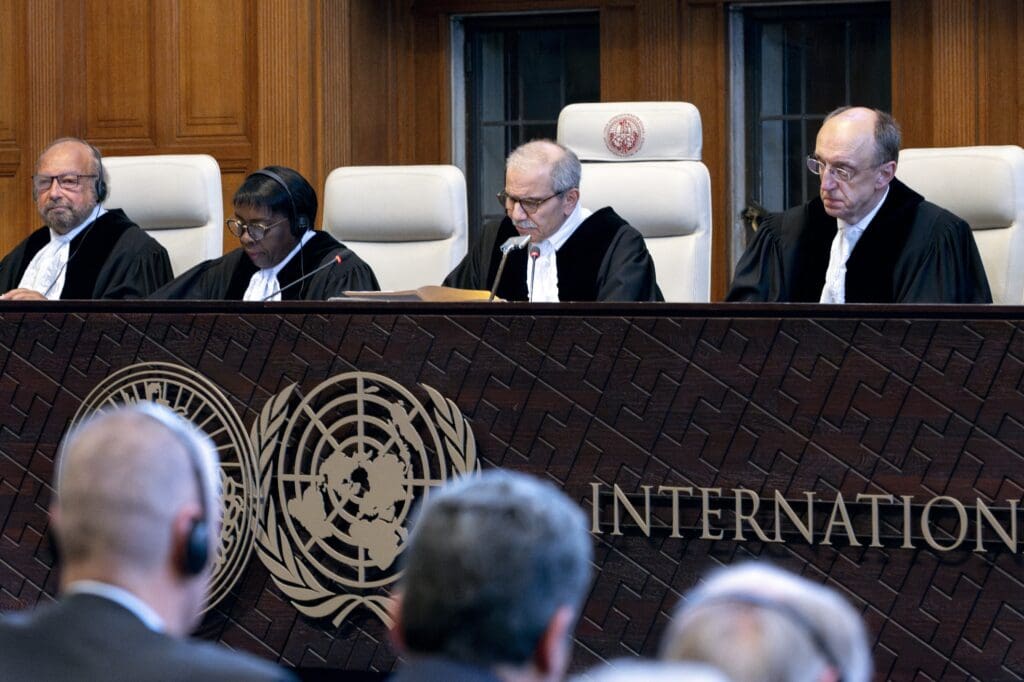In an historic ruling, the world’s highest court has deemed Israel’s 57-year-old military occupation of Palestinian territory unlawful and ordered it to end its presence there, including all its settlements and settlers, “as rapidly as possible.” The nine-point decision from the International Court of Justice at The Hague also obliged Israel to pay reparations to the population of the occupied Palestinian territories (oPt) and called on third states and international organizations to refrain from helping Israel maintain its presence there.
The court’s ruling, on July 19, came in response to a request by the United Nations General Assembly in December 2022 for an advisory opinion on the legal consequences of Israel’s prolonged occupation, as well as its denial of the Palestinian right to self-determination, its policies of settlement and annexation, its discriminatory legislation, and its efforts to alter the demographic make-up of the areas it occupies, particularly East Jerusalem.
In February of this year, 52 countries and three international organizations made arguments before the court, more than in any other case in the ICJ’s 78-year history, almost all on behalf of Palestine. Israel boycotted the proceedings.
Hope for Accountability?
Essentially, the court found that Israel is in breach of its obligations as an occupying power in several ways, that its unlawful occupation denies the Palestinians their fundamental right to self-determination, and that the current regime violates the prohibition on racial segregation and apartheid.
The ruling is a major blow to Israel and its supporters at a time when they are already under immense pressure due to Israel’s military conduct in Gaza, where in nine months it has killed at least 40,000 people—mainly women and children—displaced and starved millions, and destroyed much of the territory’s infrastructure and housing. In January, the ICJ ruled that Israel risked committing genocide. Israel has since completely ignored the measures the court ordered to avoid that gravest of crimes. In June, the prosecutor of the ICJ’s sister tribunal, the International Criminal Court, requested warrants for the arrests of Israeli Prime Minister Benjamin Netanyahu and Defense Minister Yoav Gallant on suspicion of committing war crimes and crimes against humanity in Gaza.
The latest ICJ decision is a major vindication of the Palestinian cause and brings succor at a dire moment in its history. Palestinians have long struggled to hold Israel accountable for denying their national rights. The ICJ opinion could be a meaningful asset in this regard—providing it can be leveraged to mobilize meaningful international pressure.
While the ruling is a non-binding, advisory opinion, it still carries weight within the international system due to the status of the court. In its final point, the ICJ called on the UN General Assembly and Security Council to “consider the precise modalities and further action required” to bring Israel’s occupation to a rapid end.
The decision could prompt states to step up the pressure against Israel’s settlement enterprise. In 2020, the UN published a “blacklist” of more than 100 companies operating in the settlements, to this end. But it is unclear whether states will take the court’s ruling as an obligation to cut relations with Israel entirely. While the judges clearly implied a connection between Israel proper and the occupied territories by saying that Israel has already effectively annexed occupied land, they did not explicitly acknowledge that its presence in the occupied territories has become indistinguishable from the rest of the state.
Facts On The Ground
The day before the ruling, the Knesset (Israel’s parliament) had passed a resolution declaring its “firm opposition to the establishment of a Palestinian state,” on the grounds that it would “pose an existential danger to Israel and its citizens, perpetuate the Israeli-Palestinian conflict and destabilize the region.” In effect, Israel’s entire political class has declared it has no intention of exiting the occupied Palestinian territories.
The vote, which passed with 68 in favor, nine opposed—all of them Arab Knesset members—and 43 abstentions, came amid renewed international calls for Palestinian statehood. World powers are scrambling for a path forward in Gaza once hostilities end, and multiple countries have recognized Palestine since October 7, including Ireland, Belgium and Spain. Japan and South Korea are reportedly close to following suit, which would bring the total to 147.
The Knesset resolution was tabled by a right-wing opposition party, New Hope-United Right, whose chairman said it was intended to “express the blanket opposition” of the country towards Palestinian statehood and “signals to the international community that pressure to impose a Palestinian state is futile.” Former minister Benny Gantz, seen by many in the West as the most plausible alternative to Netanyahu, also voted in favor of the resolution.
The high-profile Israeli Finance Minister Bezalel Smotrich called on Netanyahu to respond to the ICJ ruling by formally annexing the West Bank. Israeli leaders have been keen to remind both the Palestinians and Israel’s detractors abroad who controls the situation on the ground.
This year, Israel has confiscated more occupied land than in any period since the Oslo Accords were signed in 1993. Settler violence against Palestinians is at an all-time high, and more than a dozen West Bank Palestinian communities have been forcibly expelled from their land since October 7. Indeed, far right Israeli ministers have used the current crisis as cover for extraordinary actions to integrate the occupied territories into the state and transfer powers from the military to civilian control.
Shifting the Incentive Structure
Between the ICJ decision, the Knesset resolution, and the scorched earth of Gaza, the stage is set for the next phase in the showdown between Israelis and Palestinians.
In reality, the occupation passed the point of no return long ago, in the sense that Israel had successfully built a settlement enterprise designed to be politically impossible to roll back. After half a century of intensive investment in the annexation project and near total impunity for its violations of international law, the incentive structure for making peace has been turned on its head. Pro-annexation forces are too strong and vested interests too entrenched. An overwhelming majority of Israelis now believe that a Palestinian state would be an inherent threat to their security. The fact that not a single Jewish Knesset member voted in favor of a two-state solution is just the latest evidence.
Changing this dynamic will require a major shift in the current cost-benefit calculus of Israeli politicians and the Israeli public. This can only come by mobilizing substantial punitive pressure on Israel.
Yet the pathways to accountability, pressure and change are not straightforward, and certainly not guaranteed. Israel enjoys the protection and support of the world’s most powerful country, along with many others of influence. Although experts and rights groups have exhaustively reported on the criminal nature of its occupation regime for decades, Israel has maintained enough of a veil of propriety and legality to satisfy its partners.
Despite the ICJ ruling, powerful countries are generally conservative when it comes to the courts and international law, lest it be used against them at some point. The ICJ ruled this month that Israel’s wall in the West Bank was illegal and should be ripped down, but Israel has faced little or no pressure to comply.
In recent years, however, Israel’s veil of propriety has increasingly slipped and its true intentions have become visible. Successive right-wing governments have made clear that the occupation is not temporary, and that Israel intends to annex the West Bank in whole or in part. Thus, Israel’s undemocratic rule over Palestinians appears permanent. This has led many observers—including globally respected human rights groups—to conclude that Israel is practicing the crime of “apartheid,” imposing a regime of racial discrimination for the benefit of one group at the expense of another.
Indeed, roughly half of the countries that appeared before the ICJ in February included arguments on apartheid, and in its July ruling the court stated Israel was violating the prohibition on apartheid enshrined in the International Convention on the Elimination of All Forms of Racial Discrimination (ICERD).
Israel’s global image has taken a battering since October 7. From college campuses in the U.S. to cities around the world, people are voicing outrage at Israel’s policies both in Gaza and in the occupied territories more generally. The prospect of accountability appears visible for perhaps the first time. Despite the catastrophe unfolding in Gaza and the crisis of leadership in Palestinian politics, the ICJ’s historic ruling gives Palestinians a glimmer of hope that they may find a path towards liberation and achieving their rights.


